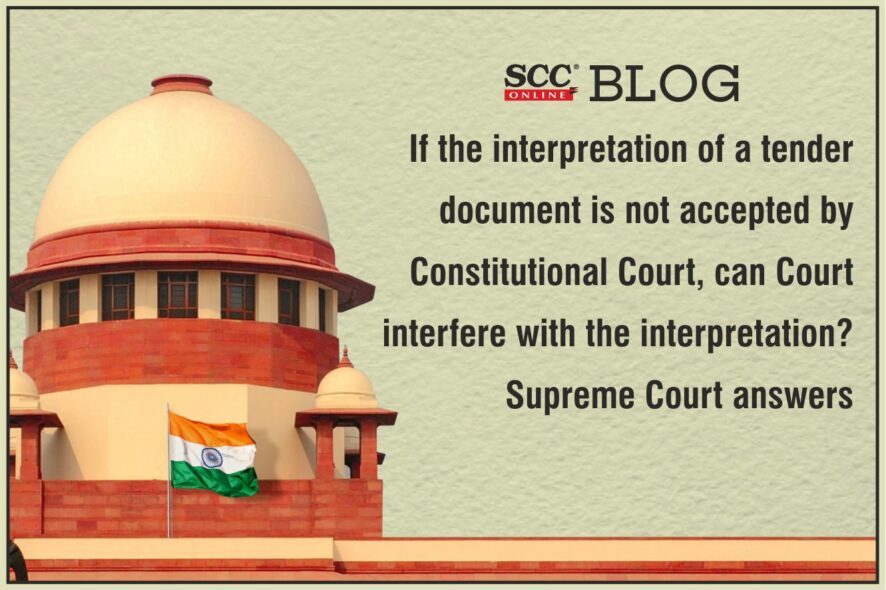Supreme Court: The Division Bench of Dinesh Maheshwari and Vikram Nath, JJ., while addressing a matter with regard to the tender document, made an observation that,
“Every decision of the administrative authority which may not appear plausible to the Court cannot, for that reason alone, be called arbitrary or whimsical.”
Two appeals against the same decision of the Delhi High Court were filed and taken up for disposal.
In the said decision, Delhi High Court had disapproved the technical disqualification and consequential rejection of the technical bid of the petitioner in respect of a tender floated by the appellant.
Another appellant was said to be the bidder (Agmatel) whose offer was accepted by NVS after technically disqualifying the writ petitioner.
Crux
Whether the Delhi High Court was justified in interfering with the view taken by the tender inviting authority in rejection of the technical bid of writ petitioner for want of fulfilment of ‘Past performance’ criterion about supply of ‘same or similar Category Products’ of 60% of bid quantity in at least one of the last 3 financial years?
Background
The dispute revolved around a Notice Inviting Tenders (NIT), as issued by the appellant-NVS on the Government online portal i.e., Government e-market Place for the supply of 68,940 Tablets for school children.
The terms and conditions that the Court is concerned with from the NIT were pertaining to ‘Experience’ and ‘Past Performance’ of the bidders.
During the pendency of the writ petition, it was informed by the tender inviting authority that the contract in question had been awarded to the other bidder who was found qualified and successful; and the application for impleadment made by the said successful bidder-Agmatel was allowed by the High Court.
Analysis, Law and Decision
Interpretation of Tender Document: Relevant Principles
The scope of judicial review in contractual matters, and particularly in relation to the process of interpretation of the tender document, has been the subject matter of discussion in various decisions of this Court.
Supreme Court remarked that,
“Author of the tender document is taken to be the best person to understand and appreciate its requirements; and if its interpretation is manifestly in consonance with the language of the tender document or subserving the purchase of the tender, the Court would prefer to keep restraint.”
Adding to the above, Court stated that the Court cannot technically evaluate or compare and even if the interpretation given to the tender document by the person inviting offers is not as such acceptable to the Constitutional Court, that by itself would not be a reason for interfering with the interpretation given.
Supreme Court opined that the impugned Judgment could not be sustained.
“….which particular product was to be treated as similar category product, could not have been a matter of interpretative exercise by the Court, particularly when the view taken by the tender inviting authority and its evaluation committee has not been shown to be absurd or irrational or suffering from mala fide.”
Further, the Bench observed that the elaborative and in-depth analysis of the features and categorization of the two products i.e., Smart Phones and Tablets was not called for.
Adding to the above, Court stated that the writ court should not substitute its preferred interpretation of the tender condition with the one adopted by the author of the tender document and the person procuring the product, who has to be regarded as the best person to understand its requirements.
Supreme Court observed from the facts and submission that, even if some of the organisations, in relation to their requirements, procured tablets and smart phones both under the same tender process or even used these expressions “interchangeably” or “interconnected”, that by itself cannot lead to a definite conclusion by the Court that “Smart Phones” and “Tablets” are to be taken as similar category products for the tender process in question.
When can Courts interfere in matters of Contracts?
The process of interpretation of terms and conditions is essentially left to the author of the tender document and the occasion for interference by the Court would arise only if the questioned decision fails on the salutary tests laid down and settled by this Court in consistent decisions, namely, irrationality or unreasonableness or bias or procedural impropriety.
“Mere elaboration by the tender inviting authority as regards its reasons and basis of the decision cannot be said to be that of inconsistency.”
Court held that, the terms of tender in the present case had been clear, and they were ascertainable with specificity available on the very portal on which NIT was issued.
In view of the above discussion, it was concluded that the petition be dismissed, and the impugned order be set aside. [Agmatel India (P) Ltd. v. Resoursys Telecom, 2022 SCC OnLine SC 113, decided on 31-1-2022]







